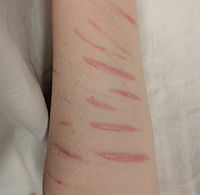
Photo from wikipedia
Objective The objective of the study was to investigate the mediating effect of regulatory emotional self-efficacy (RESE) between negative peer relationship and non-suicidal self-injury (NSSI), as well as the moderating… Click to show full abstract
Objective The objective of the study was to investigate the mediating effect of regulatory emotional self-efficacy (RESE) between negative peer relationship and non-suicidal self-injury (NSSI), as well as the moderating effect of gender difference. Methods A study of 578 Chinese adolescents (46.9% males, mean age = 16.32 years, SD =0.54) was conducted using the Child and Adolescent Peer Relationship Inventory, Regulatory Emotional Self-Efficacy Scale, and the Adolescent Self-Injury Questionnaire. Results Negative peer relationship was positively correlated with NSSI, and RESE was negatively correlated with negative peer relationship and NSSI. RESE mediated the association between negative peer relationship and NSSI. The first stage(predicting the effect of negative peer relationship on RESE) and the second stage (predicting the effect of RESE on NSSI) of the mediation effect of RESE were both moderated by gender. Specifically, compared with boys, the effect of negative peer relationship on RESE was stronger for girls, and the effect of RESE on NSSI was stronger for girls than boys. Conclusion Negative peer relationships may influence NSSI of adolescents through the mediating effect of RESE and the moderating role of gender.
Journal Title: Frontiers in Psychology
Year Published: 2022
Link to full text (if available)
Share on Social Media: Sign Up to like & get
recommendations!